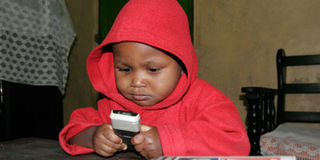Why all African presidents should be Blackberry-savvy, Kikwete style

If African babies are technophiles, why not the presidents? Photo/FILE
He apparently stepped off the plane in a foul mood and, right there on the tarmac, delivered a white-hot tongue-lashing to the awaiting chiefs of the army, police and other branches of the security services.
While travelling abroad, Tanzania’s President Jakaya Kikwete had apparently surfed the internet, visited a Swahili-language blog and stumbled across a digitally-manipulated photo which seriously insulted both his person and his office. How, he asked, had they not seen this and dealt with it immediately?
The offending site was soon shut down, and a few months later, news broke that its owner had been tracked down to the United Kingdom, with Interpol’s help. And rumour has it that he is the son of a very prominent Tanzanian independence era political activist.
President Kikwete is more tech-savvy than his security chiefs. In his first interview following his 2005 election victory, he revealed that he uses an iPod. And he is known to personally respond to the SMSs he receives from ordinary Tanzanians.
Digital prowess
It would be very interesting to test the digital prowess of other African leaders. Citizens and firms are certainly accessing the digital universe through their mobile phones and computers to improve their economic, social and political lives. Governments will undoubtedly catch up before too long, but it is not clear whether this will be good or bad for the freedom of expression, association and organisation that has been so digitally enhanced.
The speed and scope of mobile phone penetration on the African continent is yesterday’s news. The lighting up of the first of three fibre-optic cables in East Africa in the next few months will probably be of passing interest to the vast majority of people. The infrastructure story is, actually, rather boring.
The excitement emerges from the information that flows through these virtual and physical pipelines and how it shapes the relationship between citizens and their governments.
In May 1999, Prof Anthony Giddens delivered the fifth and final lecture, entitled Democracy, of the BBC Reith Lecture series on Globalisation. He said,
"In a world based upon active communication, hard power - power that comes only from the top down - loses its edge…Information monopoly, upon which the [Soviet] political system was based, has no future in an intrinsically open framework of global communications…The communications revolution has produced more active, reflexive citizenries than existed before."
Improving lives
How might African leaders react to its [technology-enabled] active and reflexive citizenry?
One option is to befriend the technology and use its potential to improve lives. Take the example of home and business addresses.
A physical address is often required to start a business, open a bank account, or a connection to a utility. But few of Africa’s fast growing cities and towns have areas with well-defined street names and plot numbers.
Using a phone with global positioning system (GPS) capability which is assigned to a particular place, previously ‘unnamed’ locations can be tagged using the phone number or the GPS coordinates.
For example, this article was written at 1° 42.26’ South and 29°15.65’ East (near Lake Kivu, Rwanda). The trick will be to make sure the phone does not move from its location, and that its owner has allowed the phone to be located by the relevant institution (bank, utility company, suppliers, and others).
A second option is for leaders to use the technology to control its people. One African government shut down the SMS system for two years between June 2005 and September 2007 after an opposition party, used it to mobilise its supporters following a hotly contested election.
In January 2008, ordinary Kenyans tracked and published, in real-time, the evolution of the 2007/08 post-election violence in the country by sending SMSs to an ’eyewitness’ website called Ushahidi.com.
Similar ‘real-time’ publication of election results collected at each polling station, faster than they could be declared by national electoral commissions, will make incumbent presidents and politicians very nervous.
Improving lives
In the name of fighting crime and abuse, Egypt, Ghana, Tanzania, Nigeria and South Africa are registering cellular SIM cards. (Kenya is on the verge of doing so).
Naturally, some unease has been expressed about this move.
However, those who cherish their anonymity and live in a ‘one network’ country may practise regulatory arbitrage by buying a SIM card from a neighbouring country where no SIM card registration is required, and using it domestically.
They would likely be willing to pay the ‘privacy premium’ – the higher tariffs resulting from calling from a ‘foreign’ country code.
The choice a government makes between allowing the technology to enable, and using it to control will depend somewhat on how familiar the head of state is with the technology. In the interests of free self-expression, they should all get Blackberries.
Africa Insight is an initiative of the Nation Media Group’s Africa Media Network Project


